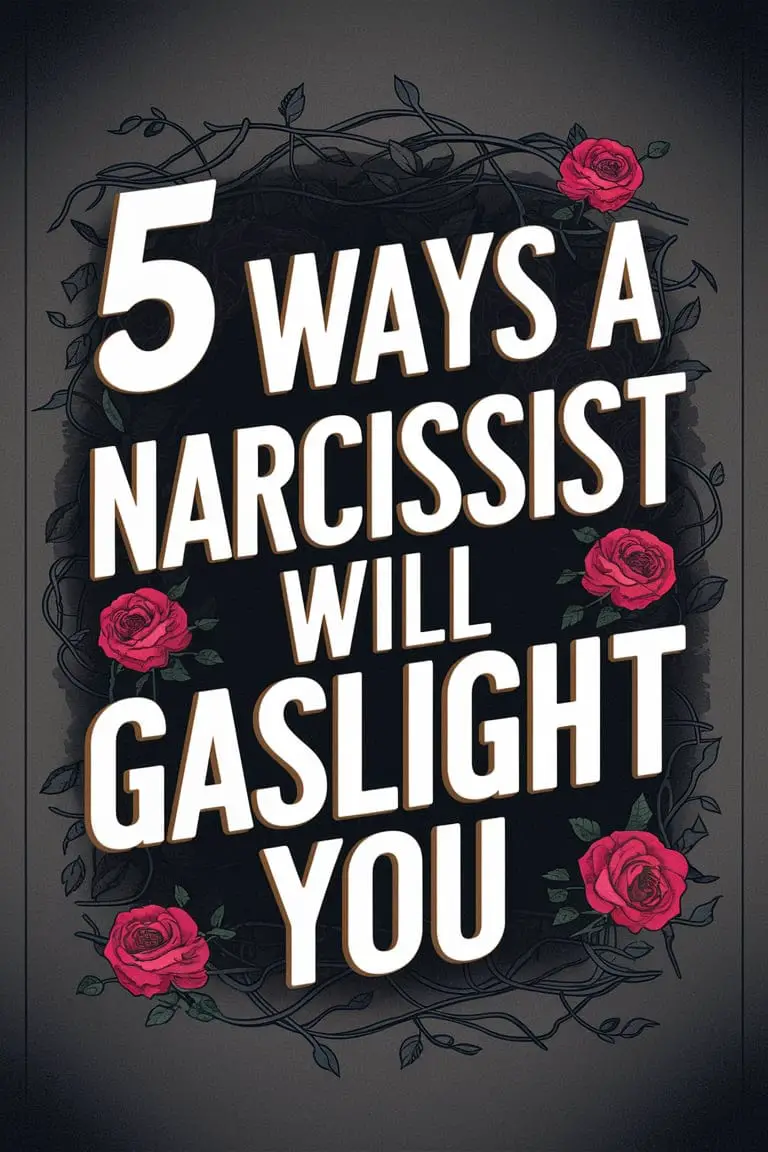When you’re tangled up with a narcissist, reality itself can start to feel like a Choose Your Own Adventure book—one they’re writing as you go, with a plot twist on every page. Gaslighting is their favorite pen.
If you’ve ever walked away from an argument feeling like you’ve misplaced your sanity (along with your car keys), you might be on the receiving end of this psychological sleight-of-hand.
Let’s shine a big, unflattering light on five classic gaslighting moves, so you can spot the madness and keep your grip on what’s real.
1. Denying Things They Clearly Said or Did
Few things in life are quite as destabilizing as someone looking you dead in the eye and telling you black is white, up is down, and, no, they never ate that last piece of cake—while the crumbs are still on their shirt. Narcissists excel at this.
You could have a transcript, a team of witnesses, and maybe a recording. Doesn’t matter. They’ll still insist, “I never said that,” or, “You must be imagining things.”
Nothing throws a person off-balance faster than standing in the ruins of an argument about something that literally just happened and being told it never did.
Ever tried to confront a narcissist with hard evidence? Prepare for them to double down. Gaslighters have a special gift for making you question your memory, your hearing, and sometimes your entire grip on reality.
If you hear yourself apologizing for “misunderstanding”—again—it might be time to pause and ask: Am I being rewritten?
2. Twisting Your Words and Making You the Villain
There’s nothing quite like trying to express your feelings to a narcissist and watching them twist your words like a balloon animal at a kids’ party.
Suddenly, your “I felt hurt when you forgot my birthday” morphs into “So now you’re saying I’m a terrible person who never does anything right?”
If you’ve ever wondered how your gentle “Hey, can we talk about what happened?” spiraled into a full-blown drama starring you as the villain, you’re not alone.
Narcissists have a sixth sense for finding emotional loopholes and exploiting them, all while leaving you to wonder if you’re the problem.
It gets exhausting, doesn’t it? The constant need to defend yourself, clarify, and apologize for words you didn’t even say. But that’s the trap: Gaslighters need you on the defensive so you’ll stop holding them accountable.
Next time your words start coming back to you with all the context of a broken jigsaw, take a step back. Their confusion isn’t your responsibility to fix.
3. Minimizing or Dismissing Your Feelings
Ever been told you’re “too sensitive” or “overreacting”? Welcome to the narcissist’s favorite pastime: emotional minimization.
Maybe you raise a concern—something small, like being left out of plans, or something bigger, like feeling ignored for months.
Instead of validation, you get a masterclass in condescension. “You’re making a mountain out of a molehill.” “Why do you always have to be so dramatic?” (Bonus points if they roll their eyes.)
This tactic works because it hits you where it hurts: your sense of self. After enough rounds of being told your feelings are invalid, you start to wonder if maybe you are overreacting.
Spoiler alert: You’re not. Your feelings are real, and anyone worth your time should treat them with respect—even if they don’t agree.
Don’t let someone shrink your emotions down to bite-sized bits just because it’s more convenient for them. Your emotional weather report is yours alone to give.
4. Spreading Lies or Misinformation to Others
There’s nothing quite like the moment you realize your social circle’s gotten a private screening of the “You Show”—and you’re being painted as the unreliable narrator.
Narcissists love recruiting an audience for their gaslighting, often by feeding half-truths or outright lies to your friends, family, or colleagues.
Notice that suddenly people are looking at you sideways, or acting cold for no apparent reason? You might be dealing with a smear campaign.
Maybe they’ve heard you’re “unstable” or “always starting drama.” Or perhaps your partner just “can’t do anything right in your eyes.” Cue the silent judgment from people you once trusted.
This isn’t just hurtful—it’s isolating. Isolation is exactly what a narcissist wants: If others question your version of events, you’re more likely to doubt yourself.
It’s easier for them to keep you under control when you don’t have a support network to turn to.
If you suspect this is happening, resist the urge to go on a reputation-fixing tour. Instead, confide in people who know you well and can see through the nonsense. Let your actions speak louder than the narcissist’s slander.
5. Using Kindness as a Weapon
Gaslighting isn’t always delivered with a scowl and a raised voice. Sometimes, it comes wrapped in a bow, with a smile that’s just a little too wide.
Narcissists excel at “hoovering”—drawing you back in with sudden kindness, grand gestures, or apologies that sound heartfelt (but last about as long as a snowflake in July).
Suddenly, after weeks of criticism or coldness, they’re buying you flowers. Or planning a romantic evening. Or texting you sweet nothings like nothing ever happened.
This is designed to make you second-guess the bad times. Was it really that bad? Maybe you overreacted…again.
This whiplash of affection and cruelty creates a cycle that keeps you hooked. “See?” they say, “I’m not such a monster after all.” For a moment, you feel hopeful things will change. Spoiler: They usually don’t.
Kindness, when it’s genuine, is steady and consistent. When it’s a tool to keep you confused and compliant, that’s not love—it’s manipulation with a cherry on top.
How to Keep Your Sanity When the Gaslights Are Flickering
Living with gaslighting can make you feel like you’re losing your mind, but you’re not. Narcissists are masters at rewriting reality, but your intuition and experience still matter.
Jotting things down can help. Keep a journal or notes on what was said, when, and how you felt. It’s not about proving them wrong; it’s about reminding yourself what’s actually true.
Reach out to trusted friends or a therapist who will believe and validate your experiences—someone who can help you keep your reality anchored when the storm hits.
Setting boundaries is crucial. You’re allowed to say, “I know what I experienced,” and leave it at that. No need to win a debate with someone who’s made a sport out of denying reality.
And if all else fails? Just remember: No matter how convincing the narcissist’s version of events may sound, you always have the right to your own story.
Your perspective is not only valid—it’s vital, especially when someone’s working overtime to rewrite the script.
Reality-check: You’ve got this.


